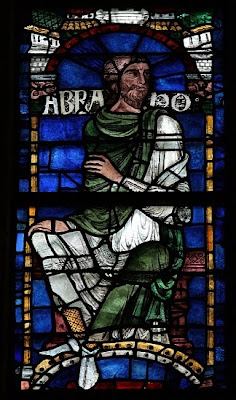 Today's sermon is based on Genesis 15:1-12, 17-18; Philippians 3:17-4:1; Luke 13:31-35
Today's sermon is based on Genesis 15:1-12, 17-18; Philippians 3:17-4:1; Luke 13:31-35 “Do not be afraid, Abram, I am your shield.”
Do you notice the first words the Lord Almighty tells Abraham? “Do not be afraid.” It is the same thing angels say when they make an appearance in the Bible: “Do not be afraid.”
What is this about being afraid and God? Maybe there is something scary about encounters with the sacred that make people feel afraid.
Maybe God knows that people become afraid when talk turns to religion: the road map of the Spirit is very sketchy, and religion can get you into a lot of trouble in a hurry in the world.
Look at the lessons this morning: fear laces throughout: God challenges Abraham to go on a long journey to a land far away; he has no idea where he is going, or how to get there, or who he might meet along the way. That is scary.
Or take the letter to the Philippians: Paul is writing to a persecuted Christian community that is facing death at any moment, and he is telling them to not be afraid.
Or take Jesus in the gospel lesson from Luke: His followers tell him that Herod is out to kill him, and Jesus ignores them. “It is not my time yet,” he tells them, “I have much to do, and besides I need to get to Jerusalem first. So stop worrying.”
All of these stories are about journeys that are filled with peril. These stories aren’t necessarily about great people with great faith.
Some people have faith, some people don’t. The stories don’t all have happy endings. What ties these stories together is God’s faithfulness to God’s people. In each story God is present, and God finds a way to bring people home from their journey, no matter how bleak or frightening the situation looks at the time.
So, that raises a question for me: Were those who wrote the Bible unafraid? I don’t think so. Then as now, there was much to fear: wars, disease, crime, natural disasters, and all manner of evil.
Then as now, bad things happen to good people through no fault of their own. All of us here know that – all of us – no matter our age or station in life.
And into that uncertainty comes our God who implores us: Do not be afraid.
Why do we hear this now, in Lent? Maybe because this is the time of year when we are most in need of hearing it.
The fact that Lent comes in the middle of winter is no accident. Lent is the 40 days leading up to Good Friday and Jesus dying on the Cross. Easter is coming, but not yet. First is the journey through the valley of the shadow of Lent, and it is tempting to not go there. But go anyway.
On this journey, we are asked to pay attention to what we see and experience on our walk to Easter.
Lent is a time of surprises. It is a time that we set aside for being just a little more intentional about our walk with God, the time to look inward at what separates us from God, and what separates us from those around us.
The reason we “give up” something for Lent isn’t out of masochistic obligation, but to bring ourselves into a place where we notice the presence of God in the ordinary.
So if you want to give up something, give up being distracted, or give up being too busy to smile or to laugh. Give up being too busy to pray.
Or this: how about giving up being afraid to hear the small still voice telling you that you really are loved, you truly are the beloved of God?
How about giving up fear for Lent?
Find a way to simplify, slow down, lighten up and discover again what really matters in life. That might lead you to saying yes to a new adventure in your life. It might lead you to reaching outside yourself by participating in one of our ministries in the community that we are celebrating today as part of our Centennial.
Notice one more thing: After God tells Abraham to not be afraid, Abraham replies, “O Lord, what will you give me?”
That sounds like a rather impertinent question: What’s in it for me?
And God replies: everything is in it for you: You will have many heirs, and much abundance; grace upon grace is yours forever. So stop worrying. “I am your shield.”
God tells Abraham that no matter how hard the journey, no matter how terrifying the darkness descending, God will be there with Abraham and his descendants.
“I am your shield,” God tells us.
We are the descendants of Abraham, each one of us. God’s promise of faithfulness to Abraham is God’s promise to us – and is ours forever. AMEN
Photo of the Abraham stained glass window at Canterbury Cathedral; the window dates from the 12th century and is south facing.
No comments:
Post a Comment